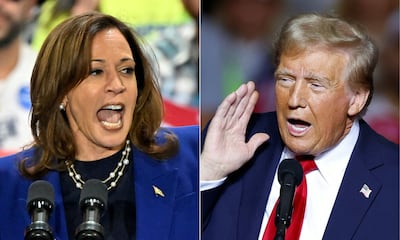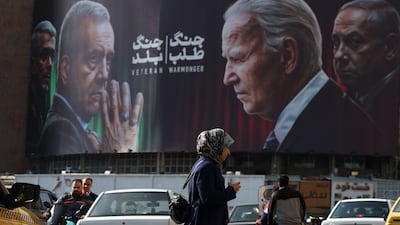As the US presidential election reaches its climax, the question on many a mind – particularly outside America – is likely to revolve around the nature of American diplomacy under either a Donald Trump or Kamala Harris administration.
The world knows Mr Trump much better than it does Ms Harris. The former president may be unpredictable, yet he is known. Ms Harris, on the other hand, remains largely unfamiliar, having spent a major part of her vice presidency under President Joe Biden’s shadow.
From the little that can be gauged from the election campaign, it is fair to say that both candidates are vastly different and distinctive in their own ways. Mr Trump is direct and blunt, while Ms Harris is enigmatic and diplomatic.
These traits will influence the American voter. America is divided between those who view candour as a virtue, even if it is accompanied by arrogance and perhaps even hostility, and those who don’t care for such traits, believing that America needs consensus, calm and gentleness – qualities associated with Ms Harris.
For the international community, the question is how either leader deals with the various challenges, including conflicts, and whether the world would be better off with the open book that is Mr Trump, or the relatively unknown Ms Harris.
During his first term in office, Mr Trump built a reputation of quickly, and sometimes unexpectedly, dismissing high-ranking officials. Instability and inconsistency characterised his administration, influenced by his own erratic behaviour.
Today, some of those former aides and officials have returned to his side while others have become very critical of him. Whatever one’s impressions of the “Maga” movement, it does have a number of intelligent, organised and capable people in its ranks.
Ms Harris, meanwhile, struggles under Mr Biden’s shadow but also that of former president Barack Obama. The Middle East team under Mr Biden is professional and experienced, and some members may become involved in a Harris administration. But will this administration be truly independent?
Many in Mr Biden’s Middle East team served under Mr Obama, too, but their diplomacy in the current term has diverged sharply from when they worked with the former president.
Mr Obama made significant blunders in the region. Key examples include his disregard for the historical relations between Washington and key Arab countries, policy regarding the Arab uprisings, and a willingness to ignore some of the Iranian government’s activities in the region, through its proxies.
This matters now because some Biden-era policies have undone the legacy of some of the decisions his former boss made.
For example, the Obama administration inadvertently enabled and strengthened both Iran and its proxies. Almost a decade later, the Biden administration has given Israel military and diplomatic support to severely degrade these same proxies, particularly Hezbollah and Hamas, as part of a strategy to dismantle the Tehran-backed “Axis of Resistance”.
In other words, the militarisation of diplomacy has become a strategic decision for the US during Mr Biden’s tenure.
The current administration has so far failed in its efforts to achieve a ceasefire in Gaza and Lebanon. It appears to be weak in the face of Israeli Prime Minister Benjamin Netanyahu’s belligerence over the past year, submitting to his refusals to comply with even the US President’s pleas.

In reality, however, Mr Biden’s diplomacy might be stemming from a strategy wherein the establishment seeks to empower Israel to destroy Iran’s proxies with decisive US support. This approach is likely to continue under Ms Harris if she wins the presidency, unless any Obama acolytes in her administration exert their influence. Needless to say, this strategy will also continue under Mr Trump if he is re-elected.
Mr Trump is unlikely to wage war against Iran to coerce it into abandoning its expansionist policies. He is unlikely to engage with its government either. Instead, he is most likely to isolate it, impose sanctions against it, and economically cripple it.
Ms Harris, likewise, isn’t likely to wage war against Iran, but instead, continue a policy of engagement through intermediaries, while tacitly endorsing Israel’s mission to dismantle Hezbollah’s military infrastructure in Lebanon and that of Hamas in Gaza.
Mr Trump’s actions, however, will not be surprising. He has made clear how he plans to deal with both Iran and Israel: he is opposed the current Iranian government and supports Israel. Yet he is not likely to encourage or assist Israel if it seeks to drag the US into a war with Iran.
The former president professes to disliking wars and prides himself on having avoided any direct conflict in the Middle East during his presidency, while he is only too happy to point out that the Biden administration has failed to end the war in Gaza. The reason for this, as Mr Trump himself claims, is his successor’s lack of determination and inability to use American leverage.
While some of it could be true, the Biden administration may well be pursuing a policy that provides diplomatic cover for one of its core strategic policies – proxy warfare, which has so far spared the US the cost of direct involvement.
Mr Trump is unlikely to abandon such a strategy, even if it means inheriting it from a Democratic administration. It is for this reason that the current scenario in the Middle East might not look very different when either Ms Harris or Mr Trump comes to power.
Webinar replay: How the war in the Middle East will shape the 2024 US presidential election


